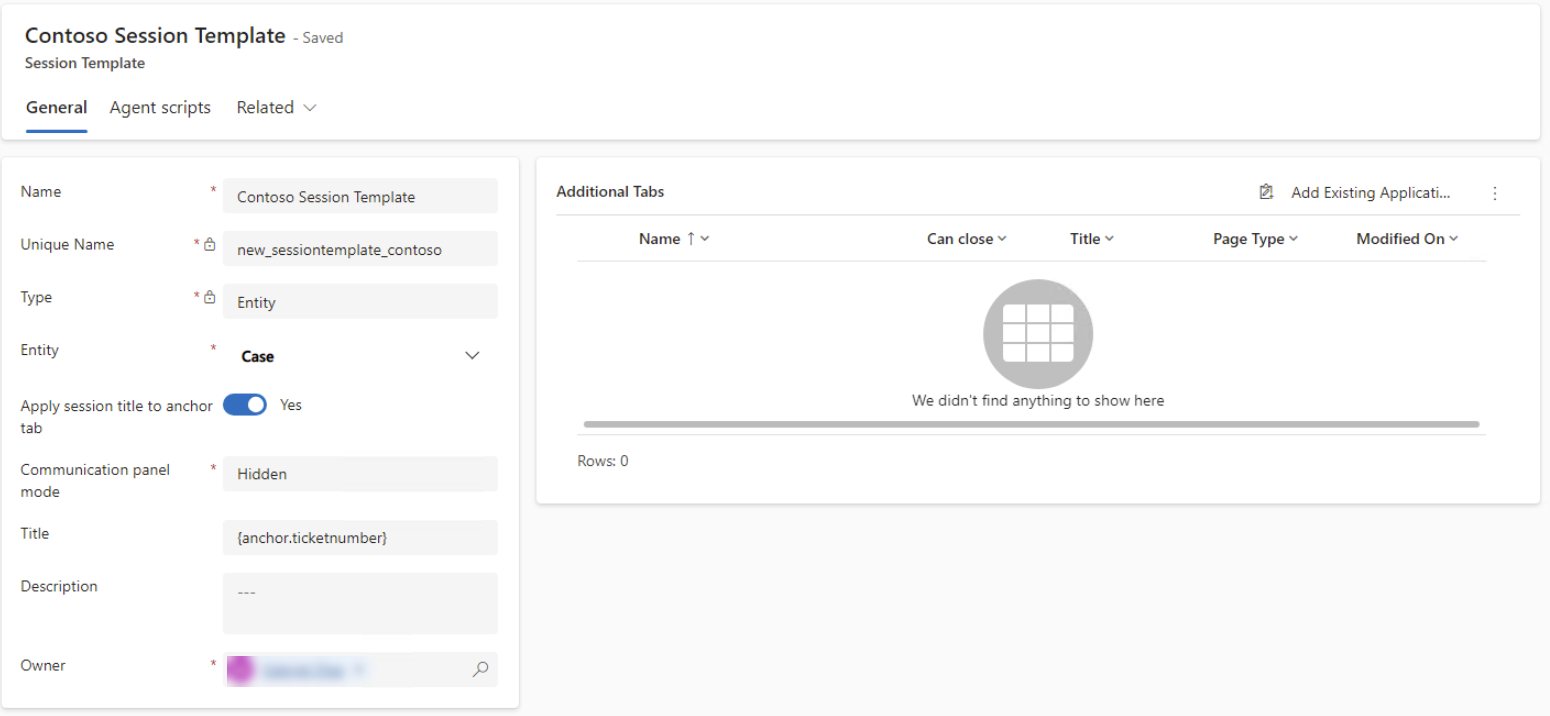Manage session templates
Applies to: Dynamics 365 Contact Center—embedded, Dynamics 365 Contact Center—standalone, and Dynamics 365 Customer Service
A session template is a combination of attributes and application tab information that can be reused.
In the Customer Service workspace app, when an agent accepts an incoming conversation request from a customer, a session is started. The system opens the Active Conversation application that you (an administrator) defined as an Anchor Tab in the application tab panel. The Anchor Tab can't be closed. Simultaneously, the system expands the communication panel for you to exchange messages with the customer.
Session templates are used to define the aforementioned session experience, such as:
- which application must be opened as an anchor tab in the application tab panel;
- what are the additional application tabs that must be opened when a session is started;
- what must be the default mode of the communication panel when a session is started.
You can create session templates in Customer Service admin center or use the out-of-the-box templates. In your environment, as an administrator, you can create multiple session templates.
Note
You can't customize the out-of-the-box session templates; instead, you'll need to create your own custom templates. Channel Integration Framework must be enabled to load generic session templates with the createsession API.
The out-of-the-box session template for using in Customer Service workspace is Case entity session - default template.
The following out-of-the-box session templates are generic and are for use in the Customer Service workspace app:
- Case entity session - default template
- Chat session - default
- Voice call session - default
- Custom messaging session - default
- Entity records session - default
- Facebook session - default
- LINE session - default
- SMS session - default
- Teams session - default
- Twitter session - default
- WeChat session - default
- WhatsApp session - default
Create a session template
In the site map of Customer Service admin center, select Workspaces in Agent experience.
On the Workspaces page, select Manage for Session templates.
Select New on the Active Session Templates page.
Specify the following on the New Session Templates page.
Tab Name Value description Example General Name Specify the name of the session. This name won't be visible to the agents at the runtime. Chat session General Unique Name A unique identifier in the <prefix>_<name> format.
IMPORTANT
The following are required for the unique name:- The prefix can be alphanumeric only and its length must be between 3 to 8 characters.
- An underscore must be there between the prefix and name.
You can select the light bulb icon, and then select Apply to verify whether the name you've entered meets the requirements.msdyn_chat_custom General Type Select one of the following:
- Entity: If you select entity, the Entity field is displayed.
- Generic: Select when the template is required to be assigned to any channel.
Entity General Entity Select an entity from the list.
Note: The option is displayed only when Type is entity.Case General Title Provide the title of the session that you want agents to see at the runtime. {customerName} General Communication panel mode Select the default mode of the panel when a session is started. Choose one of the following:
- Docked: The panel will be in expanded mode.
- Minimized: The panel will be in minimized mode.
- Hidden: The panel will be hidden.
Note: For an entity routing session—that is, for a case session—the communication panel mode is hidden.Docked General Session Icon Select an icon to represent the channel from which the conversation is initiated so that your agent can visually identify the channel.
Note:- Is available for generic type of templates only.
- A web resource file for the icon must be deployed.
- You can use a web resource file only and not slugs to customize the session icon.
- GIF files aren't supported.
WhatsApp.ico General Description Provide a description for your reference. The session template is used for a conversation request from Chat channel. General Apply session title to anchor tab Apply the customized session title to anchor tab title. Yes. General Owner Search and select an owner. By default, the user who is creating the template is set as the owner Alan Steiner General Anchor tab Select an application from the list. The application is opened by default when the session starts and can't be closed.
Note: The anchor tab option is displayed only when Type is generic.Customer summary Select Save.
Associate application tabs, agents scripts with session templates
You can associate application tabs that need to open when a session is started. Agents can't close these application tabs. You can also associate agents scripts; however, you must first configure the agent scripts. More information: Agent scripts
Go to the session template that you want to modify.
In the Additional Tab section, Select Add Existing Application Tab Template. The Lookup Records pane appears.
Type the application tab names in the search box and select the search icon. A list of records appears. Select the application tabs, and then select Add. The application tabs are added to the session template.
Select the Agent scripts tab, and set the Enable build expression toggle to Yes to define the expression to set an agent script as default for a particular session template.
Build the expression, and then select Save and close. To learn more, see Set default agent script for agents.
Select Save.

The session template is configured. Now, you must associate the session template with a workstream. To learn more, see Associate templates with workstreams.
Related information
Get started with Customer Service admin center
Manage application tab templates
Manage notification templates
Associate templates with workstreams